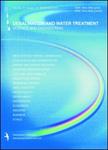版权所有:内蒙古大学图书馆 技术提供:维普资讯• 智图
内蒙古自治区呼和浩特市赛罕区大学西街235号 邮编: 010021

作者机构:Heidelberg Univ Inst Comp Engn Automat Lab PROAUT D-68131 Mannheim Germany
出 版 物:《DESALINATION AND WATER TREATMENT》 (脱盐及水处理)
年 卷 期:2009年第10卷第1-3期
页 面:200-209页
核心收录:
学科分类:0830[工学-环境科学与工程(可授工学、理学、农学学位)] 0817[工学-化学工程与技术] 08[工学] 0815[工学-水利工程]
基 金:European Commission EC (032535)
主 题:PI control Multi-loop control Multi-objective optimization
摘 要:A review about reverse osmosis (RO) desalination leads to the conclusion that the field of control system design of RO plants is still an open research subject. The standard approach considers two control loops with PI controllers. This is an economical viable solution for the control problem. However, the resulting control performance is normally suboptimal because controllers are individually tuned assuming inaccurately that the system is decoupled. In order to overcome this problem, some advanced control algorithms have been proposed in the specialized literature. However, such approaches are complicated and expensive. Therefore manufacturers of RO plants are not enthusiastic with their implementation particularly in the case of small plants. In the present work, an approach for the optimal achievement of controllers parameters based in game theory and multi-objective optimization is applied to tune the PI controllers of a simple RO plant. The methodology allows a simultaneous tuning of several controllers distributed in different coupled control loops. Moreover, some control systems topologies are compared and an optimal solution for the control problem is proposed. Thus, the main objective here is to obtain the best possible performance for the control system without having to change control algorithms and equipment. Simulation results show the advantage of using the proposed approach and make apparent the control system topology, which yields the best tracking performance.